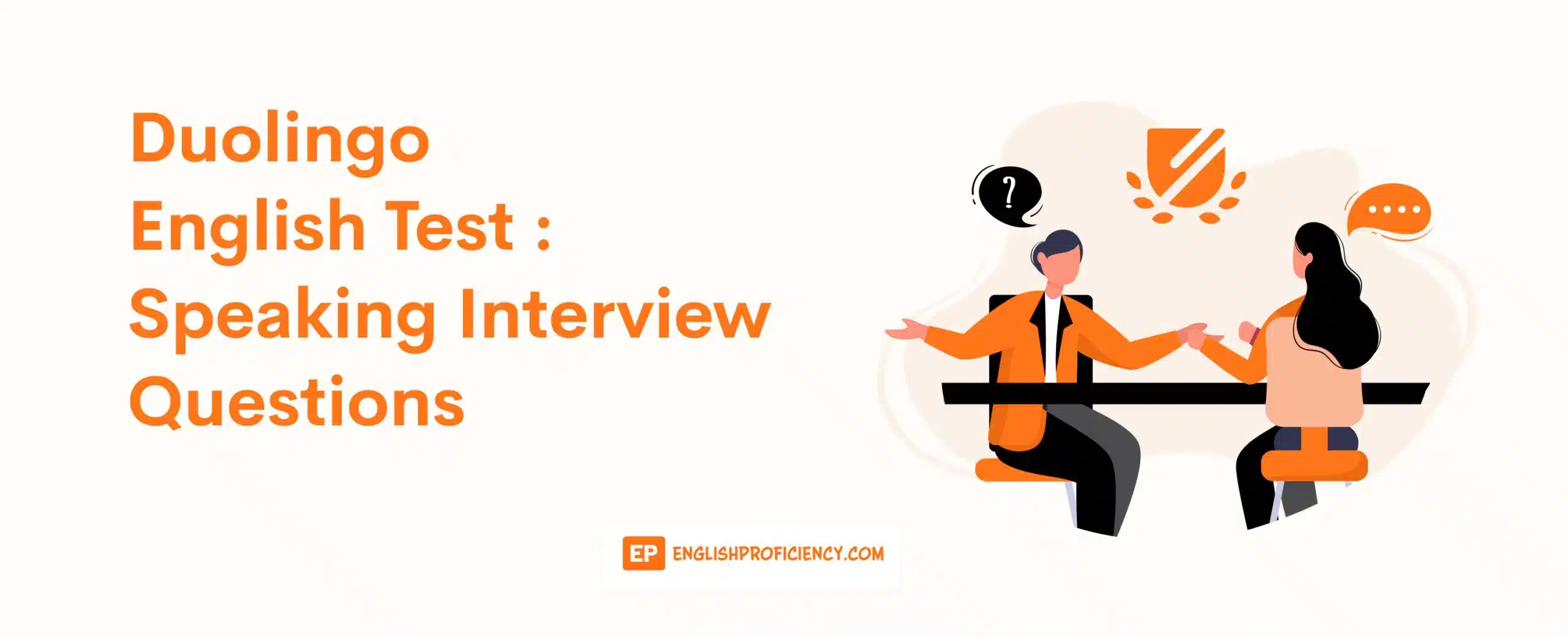If you’re considering taking the Duolingo English Exam, refer to our guide to ensure you get the maximum possible score! The Duolingo English Test will require you to perform various exercises that will evaluate your speaking, reading, and listening skills.
This article will provide you with all the information you need to prepare for the Duolingo English Test’s speaking sample and then practice with the practice questions supplied below.
- What is the Duolingo English Test?
- Overview of Speaking Interview Questions on the Duolingo English Test
- General Tips in Taking the Duolingo English Test
- Practical Tips to Ace your Speaking Sample on the Duolingo English Test
- Preparing and Structuring your Response
- Duolingo English Test Speaking Sample Questions and Responses
- Sample Practice Questions for Speaking Interview Questions
- Additional FAQs about the Duolingo English Test Speaking Sample
What is the Duolingo English Test?
The Duolingo English Test is a test that assesses a person’s ability to communicate in English. Several colleges across the globe have lately begun to accept the Duolingo exam.
With the TOEFL and IELTS examinations being stopped due to the Covid 19 outbreak, colleges worldwide have been exploring alternative test formats that are flexible enough for students. As a result of its versatility, the Duolingo exam has garnered substantial traction.
This exam is similar to other standardized exams such as TOEFL and IELTS. It assesses one’s ability to speak, listen, write, and read English; however, the biggest difference is that DET does not need you to visit a testing facility. Students have the option of taking the exam from the comfort of their own homes. All they need is a computer and internet connectivity.
Reading, Speaking, Listening, and Writing are the four sections of the Duolingo English Test, which takes around 45 minutes to complete.
The Duolingo exam may be retaken twice a month. It evaluates a student’s performance using human raters and automatic scoring algorithms.
Overview of Speaking Interview Questions on the Duolingo English Test
This part of the Duolingo English Test requires you to “Speak for 1 to 3 minutes about the topic below.”
You will be presented with two textual prompts for this sort of inquiry. You will spend considerable time discussing the individual you have chosen.
Take notice that the prompt shows for 30 seconds before the start of the recording. Throughout this period, you will read and ponder the two prompts before making your selection.
These questions give you a better idea of how the student thinks and how well you speak English.
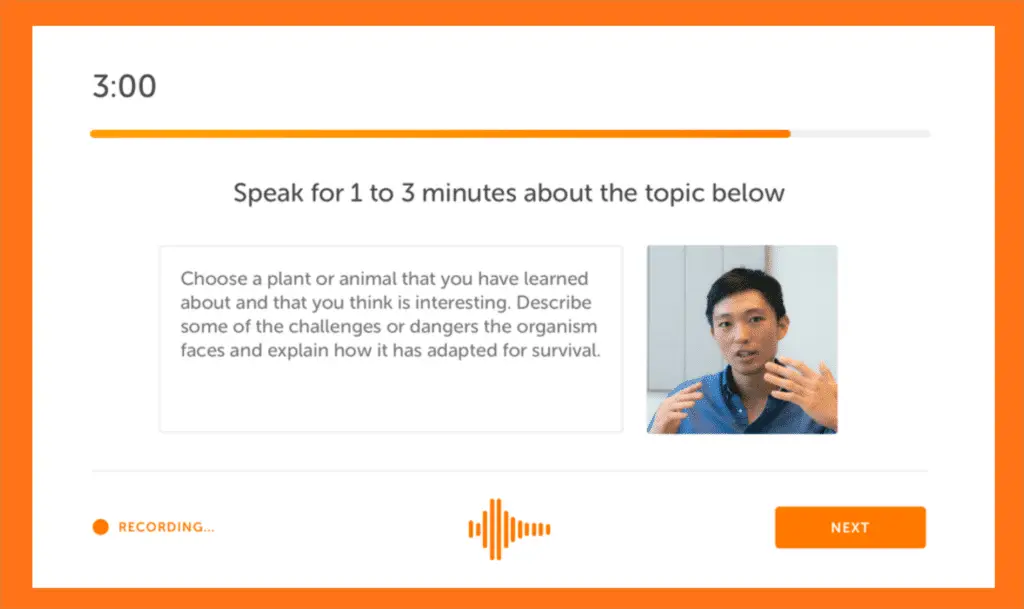
The following are some examples of prompts:
- [Explanatory] [Description] Give a brief description of the geography of the nation where you now reside. What impact does the country’s location have on its people and culture?
- [Informative description] Select a plant or animal that you find fascinating. Describe some of the risks or obstacles it confronts and how it manages to overcome them.
- [Argumentative opinion] Some schools require students to learn a foreign language. Do you believe this is a good or negative thing in general? Describe your point of view.
Key Points to Remember:
- Read a prompt and speak at length about it
- Choose 1 out of the two options
- 30 seconds to choose and prepare
- You can see the question as you’re speaking
- Speak for 1-3 minutes
- Keep talking until the next button turns orange
- It appears once on the test
- Ungraded, but the university can view the recording
What to say?
- Answer all the questions in the prompt? (2 or 3 questions)
- Talk in detail about each question
- Show the university your English level and personality
- Use examples from your life
- Elaborate and develop your ideas (reasons, for example, etc.It appears)
- Talk about yourself
General Tips in Taking the Duolingo English Test
Some students are concerned about the difficulty of the Duolingo English test. The truth is that it is easy if you prepare beforehand.
The Duolingo English Test evaluates your ability to speak English in real-life situations. To earn the greatest possible score and win entrance to the institution, you must study attentively.
The steps listed below may help you prepare for the Duolingo English exam:
- To pass the test, improve your overall reading, speaking, writing, and listening skills.
- You may use the Duolingo program to help you improve your language skills.
- You may enhance your English by reading English articles.
- There are several free Duolingo English exam preparation tools accessible online. You will also be given answers to test your knowledge. Take advantage of them and put in a lot of practice time.
- For further clarification, you should take a practice exam that is provided.
- Practice composing essays to improve your writing abilities.
- The speaking practice may be done alone or with a buddy. Make yourself at ease while speaking about yourself and your experiences.
- Start practicing with Duolingo English exam Writing sample questions online.
- Learn about basic themes, including news, current events, climate change, economy, and so on. The more you read, the more you’ll build the habit of comprehending sentence context and learning new words. Make a vocabulary list for the Duolingo English Test and practice it every day.
- Sample questions for the Duolingo English exam may be found on the website. Take advantage of it and put it to good use.
- On the Duolingo English test website, you may view video instructions. To familiarize yourself with the structure, read a brief overview of the exam experience.
- Not only can you improve your score by reading Duolingo study materials, but you can also read high-level content such as foreign periodicals and newspapers and practice writing daily.
- Several online Duolingo English exam pdf guides are available to help you prepare properly. Sample questions and answers in pdf format can help you get a feel for the Duolingo test.
Practical Tips to Ace your Speaking Sample on the Duolingo English Test
The DET Speaking Sample assesses your ability to speak verbally in English. The elements utilized to evaluate your communication abilities should not be taken lightly.
To do well, you must grasp the directions and the Speaking Questions. Your replies must also be clear and directly related to the questions. You must employ correct grammar, tenses, and vocabulary to improve your score.
Also, avoid repeating your phrases or the examiner’s queries since this may imply a lack of English proficiency. Have you done all of this and still need to improve?
The appropriate preparation of your spoken English abilities, ideally beginning long before the exam day, is the key to earning the highest score. Even if you think you’re proficient in English, there may be specific communication methods you’ve overlooked that hinder you from looking your best.
By doing so, you risk lowering your score. So it’s critical to perform the speaking exercises accurately before going into the test room and talking to your examiner.
Here are some practical tips for building your confidence and acing the Speaking Sample:
- A good rule of thumb is to avoid looking at the timer on the screen since it will distract you from effectively talking and speaking.
- Repeat what you hear when watching movies or videos in English.
- Record and hear yourself speaking in English. See if you’re saying ‘umm’ or ‘ahh’ a lot and work on eliminating that.
- Read the question carefully and make sure you comprehend it.
- Make a mental strategy for what you’re going to say.
- Don’t spend too much time pondering it.
- In 30 seconds of speaking, don’t make your response too lengthy.
- Attempt to answer all of the questions promptly.
- To explain your response, use appropriate terminology.
Preparing and Structuring your Response
You must quickly fulfill 90 minutes to impress your target institution. To achieve this, you must also use particular, intriguing words and organize your response logically. For a good pronunciation score, you must also incorporate emotion in your voice.
All of those things will happen if you follow these tactics and practice them until they become second nature.
Preparation
You will be given 1-3 minutes to talk on a specific subject in the DET speaking sample. The DET will offer you a cue card with 30 seconds to gather your thoughts before the test.
It’s critical to have a plan for this section of the speech since a speech of 90 minutes or more is a long time to talk constantly, and even some people find it difficult.
You may make this simpler by structuring your speech. Keep in mind that you should construct your speech as if you were narrating a tale. This is critical for achieving a better band score.
Below is a handy framework that, if used correctly, may be pretty effective. You can move it about because it’s flexible; you don’t have to be rigid with it.
This is just a guide to help you keep the conversation going for 1-3 minutes.
- Start with the topic.
- Speak about the past
- Speak about the present
- Speak about the future
Do not think about full phrases while taking notes during your preparation time; instead, think of keywords that you may refer to and create sentences around when speaking. Make a list of keywords for any significant information or thoughts you’d want to share.
Don’t worry about these terms too much since it will affect your fluency. You must speak naturally and fluidly. If you pause too much, you will lose points, so improve your speed.
Let’s have a look at a formula instead. This may not apply to all DET speaking practice questions. It does, however, cover the majority of them, especially those that deal with the past.
You may use a variety of acronyms to help you recall how to compose a long answer. PEE is the one we’re utilizing (point, evidence, explanation). This is applicable for both writing and speaking sample.
- Point – This should be one of your main points.
Example: "Governments must take climate change seriously."
- Evidence – One or more instances should be provided to support the statement you’ve made. Quotes, statistics, infographics, and scientific data might all be included.
Example: "NASA Earth Observatory scientists say that the average global temperature on Earth has grown by around 0.8° Celsius (1.4° Fahrenheit) since 1880, with two-thirds of the warming occurring since 1975, at a pace of approximately 0.15-0.20°C each decade."
- Explanation – This is where you explain and build evidence, as well as make a connection to the issue.
Example: "Because major rises (or reductions) in global temperature have the potential to make the world uninhabitable for people, either in its whole or at the very least specific portions of the planet may no longer be capable of supporting human existence, global climate change is important. Suppose one of the goals of governments is to ensure the safety and security of their population. In that case, governments owe it to their citizens to implement policies that attempt to reduce global warming."
Putting it all together will give you a more cohesive and well-thought response like this: "Governments must take climate change seriously. NASA Earth Observatory scientists say that the average global temperature on Earth has grown by around 0.8° Celsius (1.4° Fahrenheit) since 1880, with two-thirds of the warming occurring since 1975, at a pace of approximately 0.15-0.20°C each decade. Because major rises (or reductions) in global temperature have the potential to make the world uninhabitable for people, either in its whole or at the very least specific portions of the planet may no longer be capable of supporting human existence, global climate change is important. Suppose one of the goals of governments is to ensure the safety and security of their population. In that case, governments owe it to their citizens to implement policies that attempt to reduce global warming."
Duolingo English Test Sample Question:
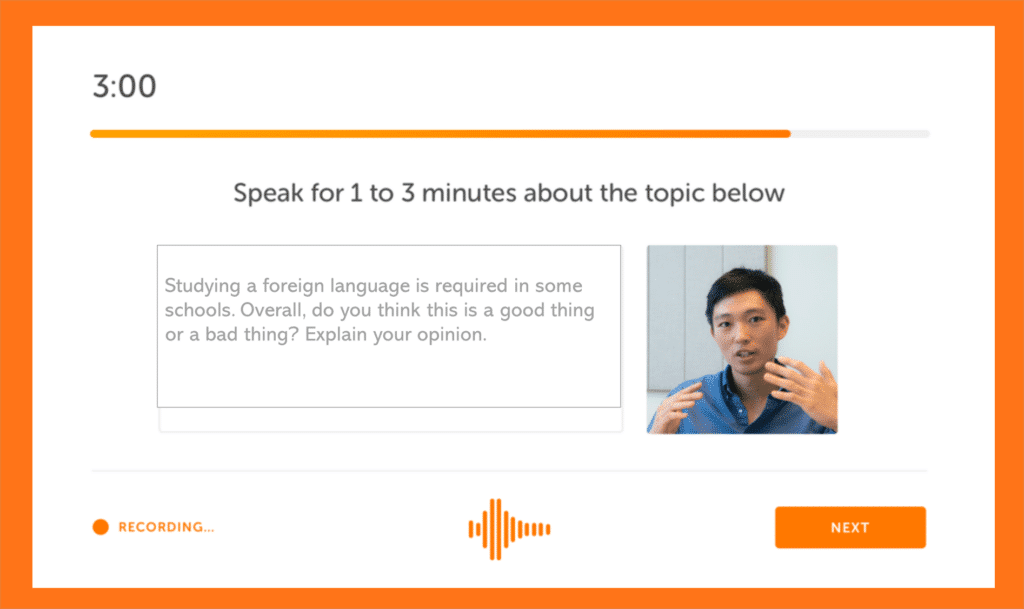
Response:
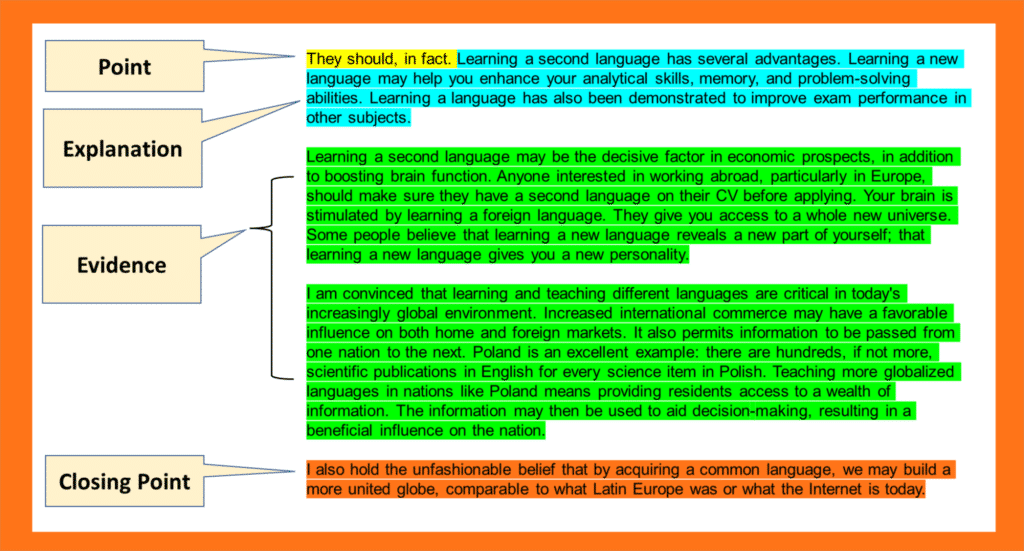
How to Structure Your Response?
1. Transition words
Transitions may be phrases or words that assist in demonstrating links between concepts in sentences and paragraphs; as a result, they are crucial in DET speaking and writing.
The nice thing about transition words is that they may be used in various locations throughout an essay.
There is a narrow line between utilizing them and overusing them when it comes to transitions. While lower-grade kids may find it simpler to start their sentences with a transition every time, you should avoid doing so if you want to improve your chances.
Instead, you should use nouns, pronouns, and adverbial phrases to start parts of your sentences.
The importance of balance in your speaking cannot be overstated. As a result, your response will automatically be structured by time, and you may use connecting words like first, firstly, after that, after that, and then, next, finally, and at long last to help you organize it.
These are some of the useful and practical connectives that you can use to express yourself:
| Additionally, and also, as well as | To contribute ideas |
| Similarly, as, in the same way | To show comparison |
| Although, despite, yet | To show contrasting ideas |
| So that, So, for this reason | To express a result/purpose |
| For example, for instance, to illustrate this | To provide examples |
Sample Response: "They should, in fact. Learning a second language has several advantages. Learning a new language may help you enhance your analytical skills, memory, and problem-solving abilities. In addition, learning a language has also been demonstrated to improve exam performance in other subjects. Firstly, learning a second language may be the decisive factor in economic prospects and boost brain function. Anyone interested in working abroad, particularly in Europe, should make sure they have a second language on their CV before applying. Additionally, your brain is stimulated by learning a foreign language. They give you access to a whole new universe. Some people believe that learning a new language reveals a new part of yourself; learning a new language gives you a new personality. Therefore, I am convinced that learning and teaching different languages are critical in today's increasingly global environment. Increased international commerce may have a favorable influence on both home and foreign markets. It also permits information to be passed from one nation to the next—for example, the country of Poland. There are hundreds, if not more, scientific publications in English for every science item in Polish. Teaching more globalized languages in nations like Poland means providing residents access to a wealth of information. And also, the information may then be used to aid decision-making, resulting in a beneficial influence on the nation. Lastly, I also hold the unfashionable belief that by acquiring a common language, we may build a more united globe comparable to what Latin Europe was or what the Internet is today."
2. Vocabulary Words
One of the difficulties you may encounter when taking the DETexam is the vast amount of vocabulary required. The idea is to concentrate on the vocabulary you are most likely to require and to expand your spoken vocabulary as much as possible in the months running up to your test.
Develop into a “word collector,” and the Duolingo English Test will become far more accessible.
- Avoid memorizing lengthy responses.
Anything you say that the examiner believes is memorized will be disregarded.
- Answers should be imaginative.
Bear in mind that the examiner is evaluating your ability to communicate effectively in English, not your opinions or general knowledge.
- Utilize a diverse and sophisticated vocabulary.
You must demonstrate that you possess a sufficient vocabulary to address non-personal subjects. The examiner will assess your ability to employ complicated sentences.
You will get credit for your efforts, regardless of whether you make errors.
- You may delay, but only for a short period of time.
Suppose you are unable to think of an answer to an examiner’s question immediately. In that case, you may use certain ‘filler’ words to acknowledge the query and demonstrate to the examiner that you are considering your response. However, avoid speaking for an extended period.
This will result in the examiner awarding you a lower grade for fluency.
- The following are some sentences you may use to fill in the gaps when you want more time:
- That is an excellent question!
- To be sure, let me look.
- This is something I’ve never considered before…
- Hmm, give me a moment to consider…
- Allow your voice to be heard.
You should talk loudly enough for both the examiner and the recording recorder to hear you. Additionally, ensure that your statements are as clear and accurate as possible.
- Look out for trigger words.
Signal words assist you in establishing the proper tense. If you are familiar with the signal word and the tense it requires, you can simply insert the right form of the verb. The following table is intended for newcomers.
Bear in mind that when dealing with more complicated structures, it is more crucial to focus on the action of the phrase rather than on a signal word.
However, it is critical to understand that signal words are appropriate in many, if not all, cases.
The following are the most important grammatical verb tenses signal terms in the English language:
The present simple has the following highly common signal phrases that express regularities (the frequency with which something occurs): routinely, generally, every year, every day, typically, often, infrequently, etc.
"On Tuesdays, Peter always plays tennis."
We have the following for the current continuous: presently, right now, this week, next month, etc.
"Right now, I'm staying at a friend's place."
The present perfect is another tense with highly effective signal words. It generally occurs in the basic form or the ing-form (progressive) when combined with the following essential words: since, for, lately; since 7 p.m., for the last five years, and so on.
"It's been three years since Mary has seen her dearest buddy."
For the simple past, you may also depend on the essential words: Last year, two hours ago, last weekend, in 2007, and so on.
"In 2010, Francis relocated to Italy."
There are several signal words in the past perfect as well. You must, however, be cautious since they might also stand for the present perfect. The following are some essential terms: just, never, for, since, already, and so forth.
"By the time the band began playing, we had already departed."
In these sample questions, focus on the bold phrases. These are trigger words that will help you determine the proper verb tense to use in your responses.
- How long have you been doing (something)?
- Use present continuous tense.
- Will you read a similar book?
- Uses future tense
- How did you first hear about the book?
- Uses past tense
Although English has a significant number of signal words for other tenses, we are constrained when it comes to future tenses. A few idioms or terms refer to the future, although they are all somewhat vague. As a result, you should avoid relying on certain ones.
- Showcase yourself.
Many people are nervous about what to say and how to say it when asked to start speaking without any support or prodding. So, understanding how to cope with anxieties is the first step toward improving performance.
Simultaneously, you may experiment and attempt new things to help you prepare and succeed.
- Respond to all of the questions.
Don’t forget to answer all of the questions on the subject card. You will be penalized if you do not provide all the required information.
- Maintain your concentration.
Make sure you react precisely to the instructions on the page and that you don’t go off on tangents.
- Timing:
Make use of your prep time to come up with a response to your given question. This section of the card necessitates a longer answer that includes primary ideas and supporting information.
Remember that you are not allowed to jot down notes or write anything. With that being said, make sure to organize your thoughts well, following the pattern that we provided above. This will help you ensure a decent and well-thought response.
Duolingo English Test Speaking Sample Questions and Responses
Sample 1:
Sample Question:
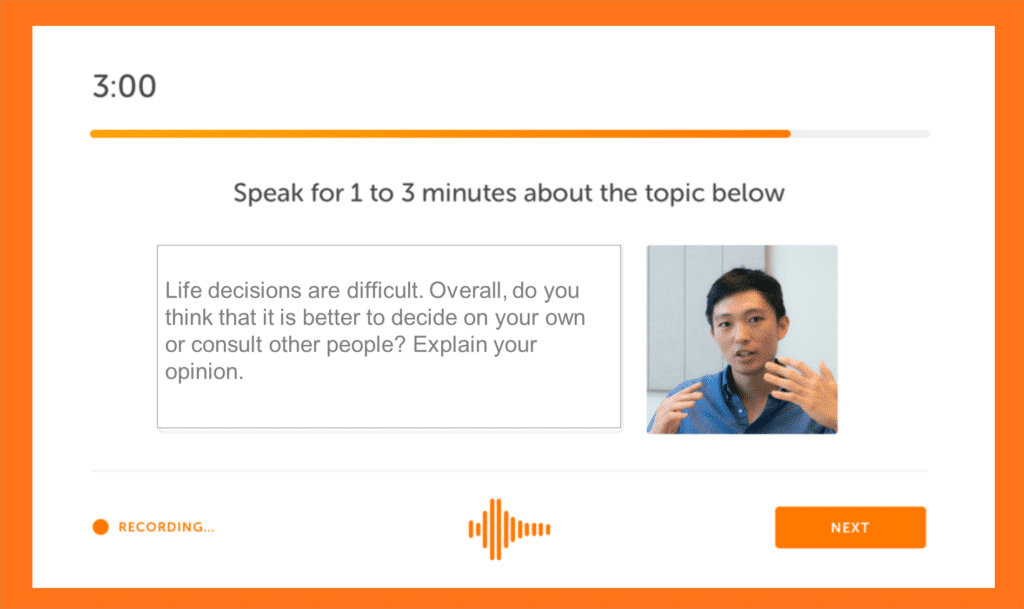
Sample Response:
"I believe there are valid arguments for both positions. In the end, it's your life. Thus I think you should be in charge of making judgments. On the other hand, any choices you make might impact other people, so it is only fair to consult with them first before proceeding. I'm afraid there is no clear solution to this topic, as there are too many philosophical problems. If you find it difficult to make decisions, it is never too late to learn. You'll find plenty of self-help books that promise to teach decision-making skills if you visit a bookshop, for example. However, I'm not certain that any of them are successful. I believe it depends on what kind of choice you're referring to. As for business strategy, I'm certain that some choices are better than others, and business schools train students to think in that way. In the case of a moral dilemma, I'm not sure anybody can claim to know the correct option. Thus how could anyone possibly teach it to someone else?"
You may score highly by:
- Providing balanced responses to each of the questions
- Before responding, consider using a time-buying approach. Paragraph 2: If you go to a bookshop, you’ll find…
- Different alternatives might be explored by using depends and conditional statements
- Using speculative verbs such as assume and speculate
- Using the word you in a broad meaning to refer to ‘any individual.’
- At the conclusion of each response, the student should refer to the original question.
Sample 2:
Sample Question:
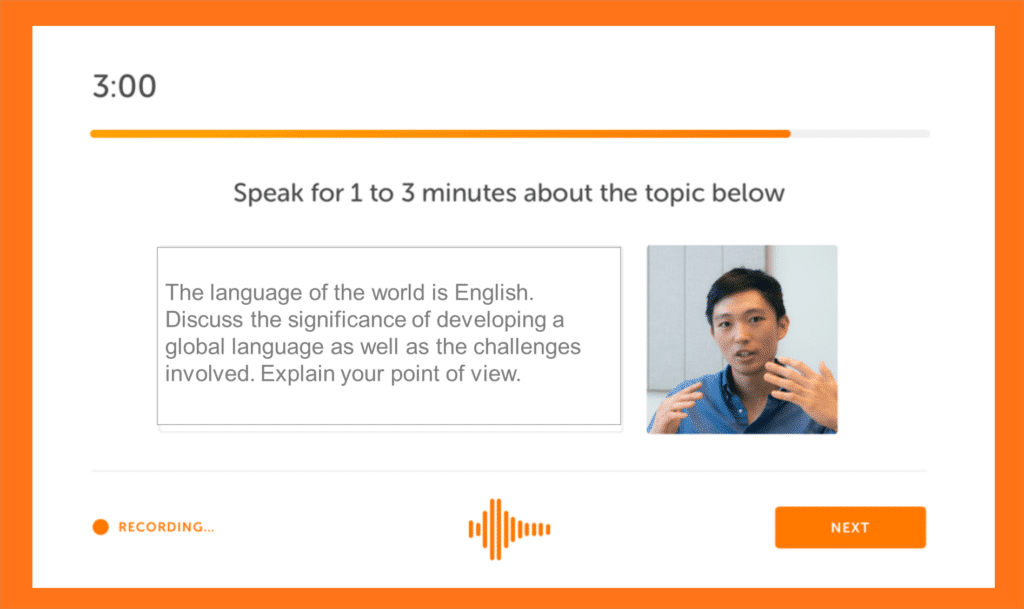
Sample Response: "That is a great question. Actually, I've never given it any consideration before. Don't we all simply think it should be in English? But what other languages could we be able to use? I believe Chinese is becoming a more significant language, although most people find it difficult to pronounce. English is already the dominant language in academics and industry, so it may as well remain so. Do you mean developing a new language from scratch? Yes? I mean, it's not like it's never been done before, right? Of course, there had Latin, which was spoken all throughout Europe, but I'm not sure it was designed for that purpose. Actually, I believe there was a worldwide language approximately a century ago. What was the name of the language again, Esperanto? Er, but it was soon forgotten. To clarify, uhm… I don't believe anybody has ever succeeded in inventing a global language, and I doubt it will ever be achievable in the future."
You may score highly by:
- Buying time with filler expressions: That’s a very intriguing question; I mean, um…
- Rather of being quiet, think loudly (both questions)
- Rather than just asking for assistance, ask a clarifying question: Do you mean…?
- Rephrasing a notion using a fluency expression: What I’m attempting to convey is…
- Even if unsure from the start, you are indicating a viewpoint towards the conclusion of each response.
Sample 3
Sample Question:
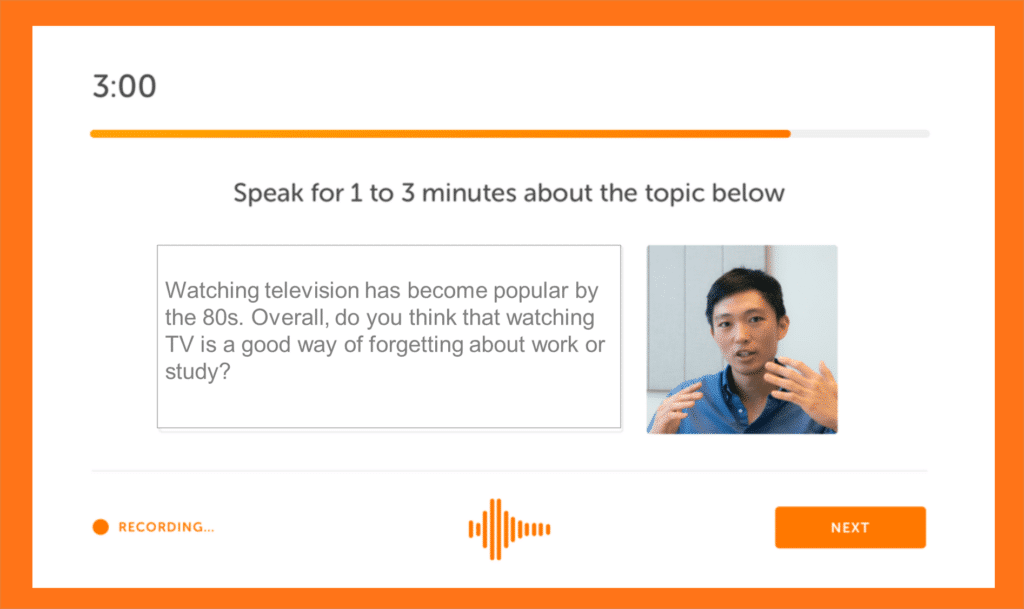
Sample Response: "Yes, absolutely. Nowadays, there is so much entertainment to choose from that we may entirely immerse ourselves in it. You know, you can switch on a good drama or comedy program and forget about everything that occurred earlier in the day. I believe that if we didn't have television, we'd all go insane. Television has a lot of educational value: it can be used to spread knowledge, develop awareness, and expose people. It may be utilized as a learning tool both at home and in the classroom. There is no shortage of instructional information with the variety of channels available. The list would be limitless if it included science, geography, history, travel, wildlife, sports, health, nutrition, and agriculture. All that is required is for a parent or teacher to carefully choose appropriate information for the youngster. Television's instructional value grows as a result of its tremendous visual impression. It guarantees that when youngsters watch, for example, a nature program, they retain more information than when they pore over equivalent stuff in a printed book. However, we only have one life to live, and it is up to us to maximize it. Every hour of the day is a wise investment, both now and in the future. If you invest correctly, your life will be filled with incredibly beautiful individuals who are doing incredible things and experiencing incredible experiences."
You may score highly by:
- Using strong (dis)agreement expressions: Yes, without a doubt; I am fully opposed to this.
- To prevent ‘parroting’ the question, use ellipsis or substitution: Yes, without a doubt; I am entirely opposed to this.
- Supporting a point of view for a variety of reasons
- Making broad remarks about people using you, us, and them
- essential aspects of the question rephrased: a good time with friends; a good time with coworkers; a good time with
- When a response grows rather lengthy, summarize the key point: So, to summarize…
Sample 4
Sample Question:
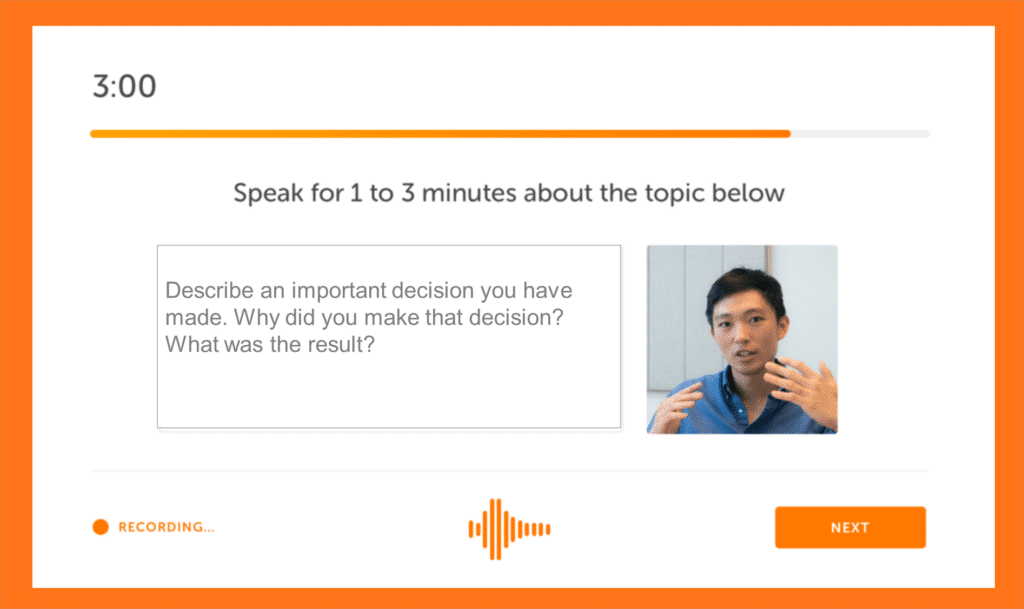
Sample Response: "One difficult decision I’ve had to make a few times in my life is which city to live in next. It’s a particularly difficult decision because it affects everything, from friends and family to finances and social life. The most difficult one of all was deciding to move out of my home country. One year, I decided to make a big change and move abroad to Indonesia. I didn’t speak the language, but I was ready for a new challenge and to experience a very different way of life. In the end, it wasn’t always easy to get by. But I was very glad to get out of my comfort zone, make new friends, and broaden my horizons. Moving to Indonesia helped me to gain my confidence because I was in a new environment, but I managed to thrive. I met so many amazing people, many of whom I’m still in touch with today, and most of all, it gave me the confidence to be more adventurous in my life. I think that’s the main result of my decision to move to Indonesia. "
You may score highly by:
- Covering all the points
- Talk about your experiences; it brings out your personality
- Making broad remarks about people using you, us, and them
- Restating the question
Sample Practice Questions for Speaking Interview Questions
As you try these questions, record and time yourself…
Question 1
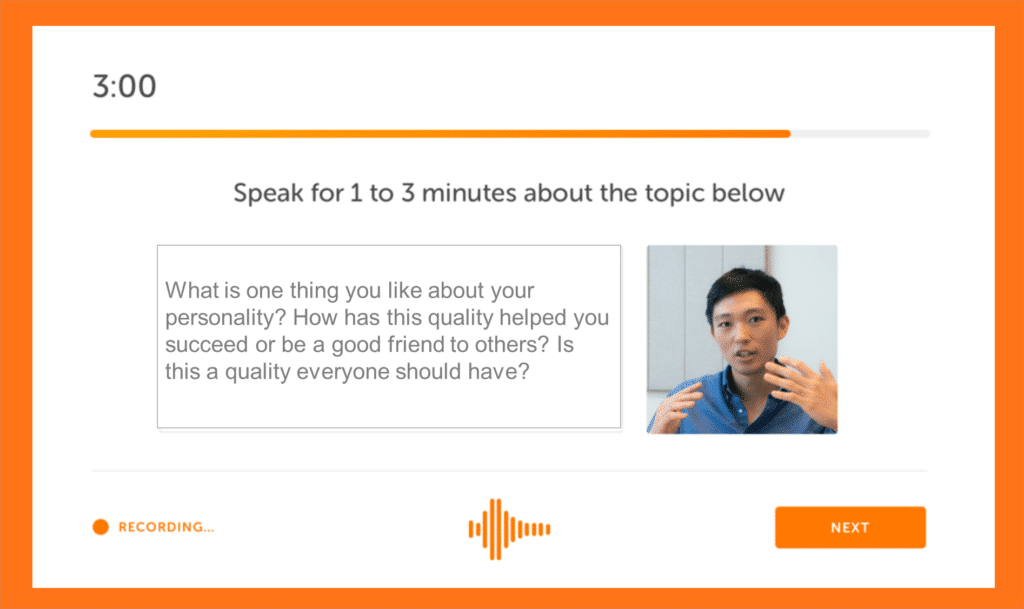
Question 2
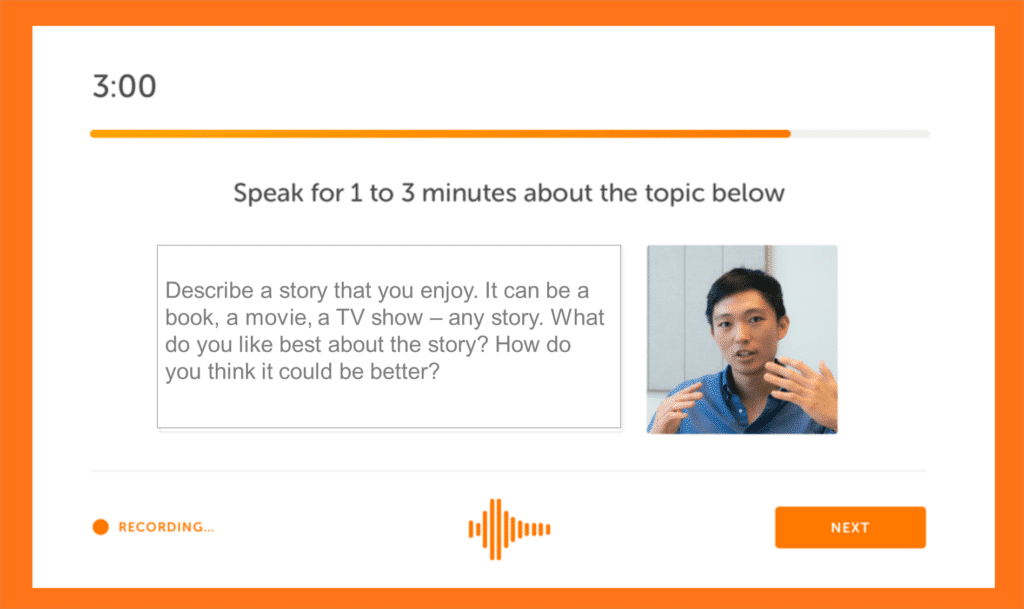
Question 3
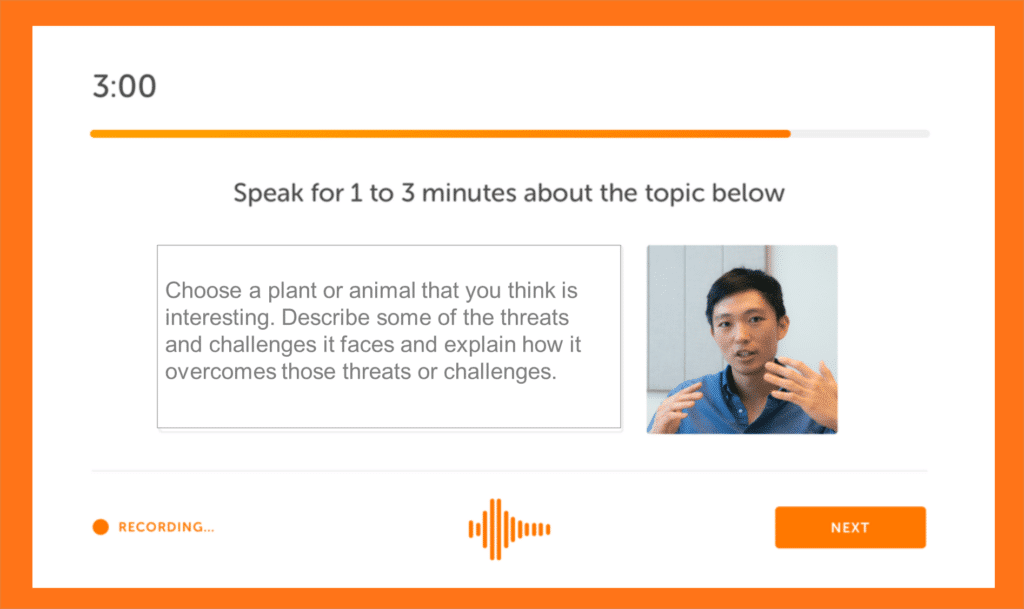
Question 4
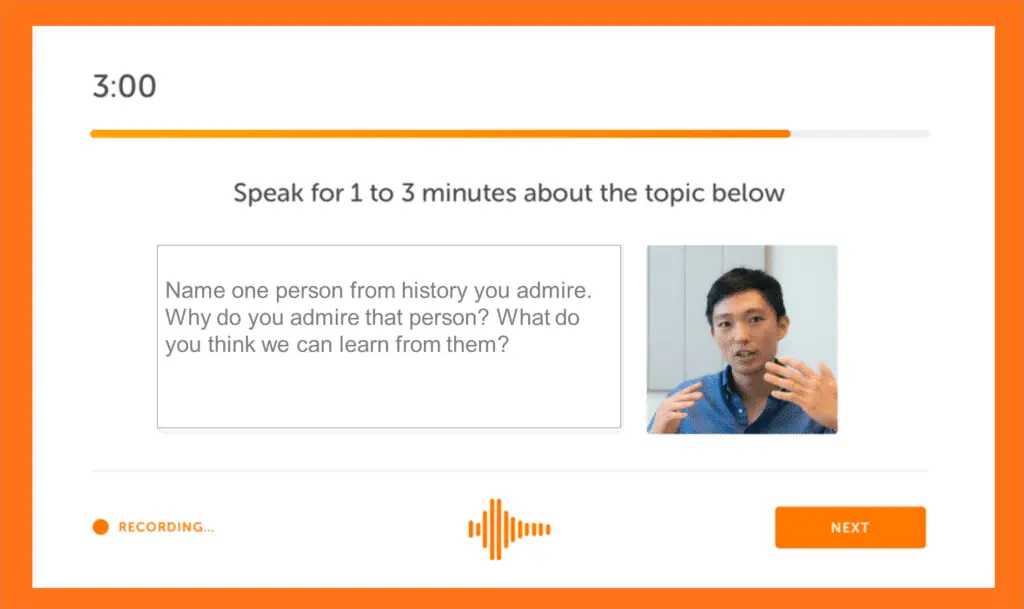
Question 5
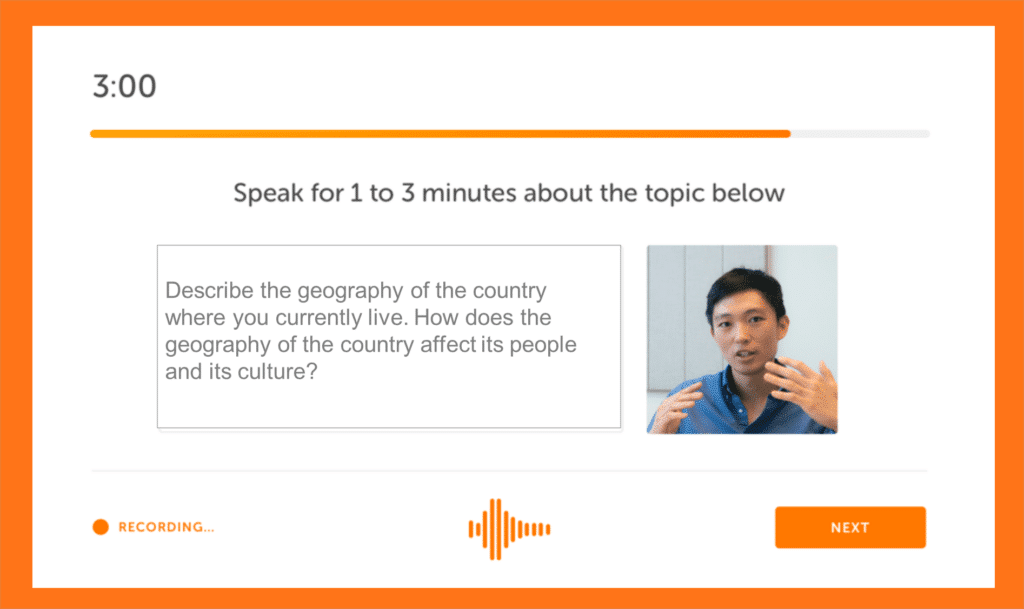
Additional FAQs about the Duolingo English Test Speaking Sample
What are the Possible Consequences of Violating the DET Rules?
If you break any of the Duolingo as mentioned earlier English Test guidelines, you will be subject to the following penalties:
Duolingo has the right to refuse certification of your exam results.
Officials have the authority to nullify any previously confirmed Duolingo results without providing a refund.
Applicants may also be barred from taking the Duolingo English Test in the future.
After you’ve finished the exam, the invigilator will review your test video to ensure you followed all of the requirements. Prepare properly and get a high Duolingo score to gain admission to an international college for further education.
Duolingo scores may be used in Canada, the United States, the United Kingdom, Australia, New Zealand, and many other popular studies abroad destinations.
Because student feedback is essential, we discovered that most students find the Duolingo English Test style to be more convenient and less stressful.
How to Practically Prepare for the Speaking Interview Questions?
This Duolingo English test pattern element is ungraded and just looks at your speaking abilities.
Here are some pointers on how to prepare for the video interview component of the Duolingo English test:
You must talk for 1 to 3 minutes on one of the themes assigned by the Duolingo assessors.
The video’s examiners will put their speed, fluency, enunciation, and confidence to the test.
As a result, you must work on all of them.
You have the option of speaking for longer than the allotted time.
You are not encouraged to concentrate on the timer, according to Duolingo English exam preparation. It may cause them to get distracted and stutter, resulting in rejection.
What is a Commendable Duolingo Score?
At Duolingo, they think that a test’s content should be tough, but not its administration. That’s why the Duolingo English Test is intended to adjust fast to a test taker’s learning level, excluding stuff that is either too challenging — or too easy.
With that, a score of 120 or above on Duolingo is considered exceptional. It is similar to a grade 7 or higher on the standard IELTS due to the Duolingo IELTS conversion.
What Happens to My Test if I Violate the Duolingo English Test Rules?
The program might record your screen as soon as you start the exam. It also has detection algorithms to identify when you exit the test browser or switch to a new tab.
After finishing the exam, a remote proctor will evaluate all of these factors. The remote proctor will instantly invalidate your test score if you break a rule during the exam session.
“Duolingo maintains the right not to certify your test results or to invalidate any previously certified results, without issuing a refund,” according to the Duolingo English Test Rules and Requirements.
Test takers may be permanently barred from taking the Duolingo English Test, depending on the severity of the infraction.”
Is it Possible for Me to Take a Practice Test Before the Real Duolingo English Test exam?
On Duolingo’s website, you may take a sample test, which you should take many times to gain a feel for the various types of adaptive questions in real-time.
After you’ve gone over a few of the questions, you’ll notice that some of the questions you saw at the start of the test start to pop up again. Use the timer on the top left-hand side of each question to keep track of your time.
Keep in mind that the sample test is considerably shorter than the actual Duolingo English Test – just 15 minutes in its place of 45 – and that, although it may give you a rough idea of your score, it isn’t entirely accurate since the sample exam utilizes a much smaller pool of questions than the real DET.
